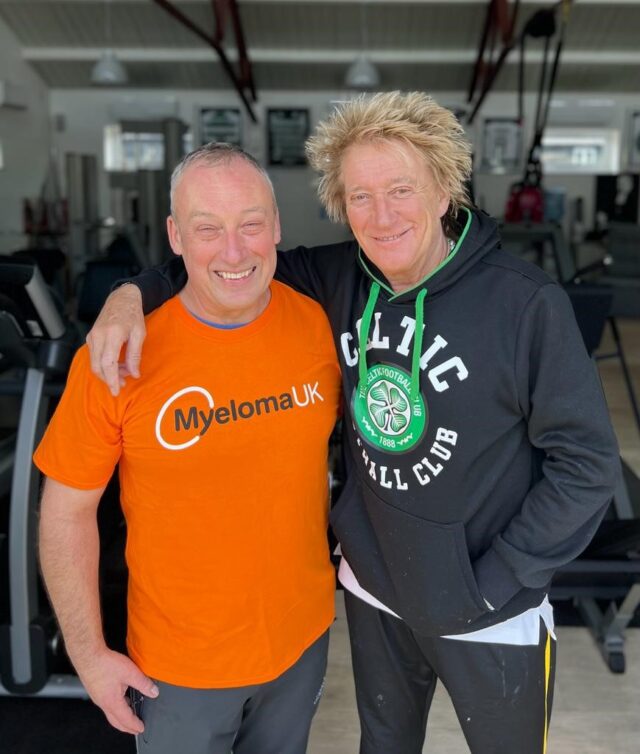Sir Rod Stewart’s personal trainer waded through thick snow and ice to complete the gruelling SAS Fan Dance challenge on Saturday in a bid to fund a cure for his sister’s blood cancer.
Gary O’Connor, from Harlow, tackled the infamous 24km hike across the Brecon Beacons to raise funds for Myeloma UK, a charity close to his heart after his sister Jan Jenner was diagnosed with myeloma in 2012.
Gary, who has worked as Sir Rod Stewart’s personal assistant and fitness trainer for 23 years, was joined on the perilous march by his friend Lee Arrowsmith.
The pair bravely trudged through snow and ice to make the 2,907ft ascent up the highest mountain in the Brecon Beacons all while hefting between 25lb and 35lb on their backs – not including food and water.
They’ve now raised £3,370 for Myeloma UK.
Gary, 63, said: “I totally underestimated how hard it would be plus the weather conditions made it very challenging. We are both overwhelmed with the experience. It was the hardest thing we have both every done – a massive physical and mental challenge, totally life-changing and unforgettable.
“We both had to run the final 20-30mins in order to get to the halfway point before cut-off time. Thank goodness we both made it in time.
“By far the biggest challenge was Jacob’s Ladder, the final climb of the route. It was unbelievably hard after probably 12- 13 miles of strenuous effort. The return half of the course was brutal as we were exhausted.
“The highlight was the whole experience and the way it challenged us – the stunning scenery up on the mountains, the camaraderie from other participants willing each other onwards.”
Gary added: “It’s been amazing to link the challenge to Myeloma UK, a great charity which directly contributes to my sister’s continuing battle with myeloma.
“My sister has had to cope with bouts of chemo, a transplant, stays in hospital and all the associated sickness and side-effects from dealing with treatments to help her.
“It would be an amazing thing for me and Lee to think that, in some small way, we have contributed to the efforts of finding a permanent cure to myeloma in the not-so-distant future and one that would benefit my sister and all sufferers of this currently incurable illness.”
Gary’s sister Jan, a mother-of-two from Dunmow, was initially diagnosed with smouldering myeloma, an early form of myeloma which usually progresses to active cancer at a slow rate, after a routine blood test.
A few months later she started feeling pain in her hip “and started hobbling”. An MRI showed her pelvis was at risk of fracturing.
Her cancer had become active. It was incurable.
Jan, then 56, swiftly received chemotherapy and a stem cell transplant.
Unfortunately, after nearly a decade in remission, her cancer returned earlier this year. She is due to undergo a second stem cell transplant soon.
Jan, 66, said: “When I was told I had myeloma – by a doctor who didn’t even look up from their computer when they said it – I was distraught. I was on my own and I came out in tears.”
She added: “I’m touched that my brother did this for me. For me it’s about raising awareness of myeloma so more people know about it. I remember first hearing the word ‘myeloma’ and thinking it was skin cancer, ‘melanoma’, not myeloma. There is so much more that needs to be done to make sure people know about it and to improve information around it.”
Myeloma occurs in the bone marrow and currently affects over 24,000 people in the UK.
It kills 3,000 patients in the UK each year.
Despite being the third most common type of blood cancer, it is especially difficult to detect as symptoms, including back pain, easily broken bones, fatigue and recurring infection, are often linked to general ageing or minor conditions.
While it is incurable, myeloma is treatable in the majority of cases. Treatment is aimed at controlling the disease, relieving the complications and symptoms it causes, and extending and improving patients’ quality of life.
More than half of patients face a wait of over five months to receive the right diagnosis and around a third are diagnosed through A&E. By that point, many of them are experiencing severe or life-threatening symptoms.
Despite battling the elements and trudging through snow, Gary and Lee managed to reach the finish line in 6h27min.
“The Fan Dance is something I’d always wanted to do,” said Gary. “I’ve always been fascinated with the special forces and, as a personal trainer, how developing mental resilience can aid in dealing with illness, stress and other life challenges.
“Doing this for my sister and for Myeloma UK was an absolute no brainer.”
To make a donation go to https://www.justgiving.com/fundraising/gary1andlee1




